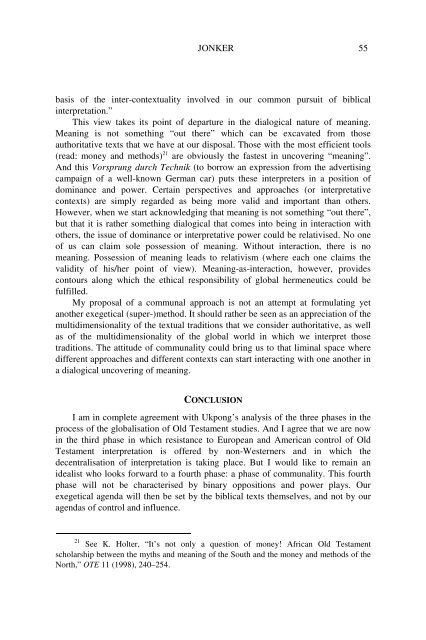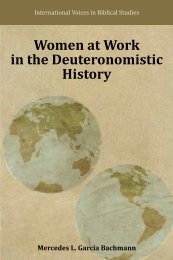Global Hermeneutics? - International Voices in Biblical Studies ...
Global Hermeneutics? - International Voices in Biblical Studies ...
Global Hermeneutics? - International Voices in Biblical Studies ...
You also want an ePaper? Increase the reach of your titles
YUMPU automatically turns print PDFs into web optimized ePapers that Google loves.
JONKER 55<br />
basis of the <strong>in</strong>ter-contextuality <strong>in</strong>volved <strong>in</strong> our common pursuit of biblical<br />
<strong>in</strong>terpretation.”<br />
This view takes its po<strong>in</strong>t of departure <strong>in</strong> the dialogical nature of mean<strong>in</strong>g.<br />
Mean<strong>in</strong>g is not someth<strong>in</strong>g “out there” which can be excavated from those<br />
authoritative texts that we have at our disposal. Those with the most efficient tools<br />
(read: money and methods) 21 are obviously the fastest <strong>in</strong> uncover<strong>in</strong>g “mean<strong>in</strong>g”.<br />
And this Vorsprung durch Technik (to borrow an expression from the advertis<strong>in</strong>g<br />
campaign of a well-known German car) puts these <strong>in</strong>terpreters <strong>in</strong> a position of<br />
dom<strong>in</strong>ance and power. Certa<strong>in</strong> perspectives and approaches (or <strong>in</strong>terpretative<br />
contexts) are simply regarded as be<strong>in</strong>g more valid and important than others.<br />
However, when we start acknowledg<strong>in</strong>g that mean<strong>in</strong>g is not someth<strong>in</strong>g “out there”,<br />
but that it is rather someth<strong>in</strong>g dialogical that comes <strong>in</strong>to be<strong>in</strong>g <strong>in</strong> <strong>in</strong>teraction with<br />
others, the issue of dom<strong>in</strong>ance or <strong>in</strong>terpretative power could be relativised. No one<br />
of us can claim sole possession of mean<strong>in</strong>g. Without <strong>in</strong>teraction, there is no<br />
mean<strong>in</strong>g. Possession of mean<strong>in</strong>g leads to relativism (where each one claims the<br />
validity of his/her po<strong>in</strong>t of view). Mean<strong>in</strong>g-as-<strong>in</strong>teraction, however, provides<br />
contours along which the ethical responsibility of global hermeneutics could be<br />
fulfilled.<br />
My proposal of a communal approach is not an attempt at formulat<strong>in</strong>g yet<br />
another exegetical (super-)method. It should rather be seen as an appreciation of the<br />
multidimensionality of the textual traditions that we consider authoritative, as well<br />
as of the multidimensionality of the global world <strong>in</strong> which we <strong>in</strong>terpret those<br />
traditions. The attitude of communality could br<strong>in</strong>g us to that lim<strong>in</strong>al space where<br />
different approaches and different contexts can start <strong>in</strong>teract<strong>in</strong>g with one another <strong>in</strong><br />
a dialogical uncover<strong>in</strong>g of mean<strong>in</strong>g.<br />
CONCLUSION<br />
I am <strong>in</strong> complete agreement with Ukpong’s analysis of the three phases <strong>in</strong> the<br />
process of the globalisation of Old Testament studies. And I agree that we are now<br />
<strong>in</strong> the third phase <strong>in</strong> which resistance to European and American control of Old<br />
Testament <strong>in</strong>terpretation is offered by non-Westerners and <strong>in</strong> which the<br />
decentralisation of <strong>in</strong>terpretation is tak<strong>in</strong>g place. But I would like to rema<strong>in</strong> an<br />
idealist who looks forward to a fourth phase: a phase of communality. This fourth<br />
phase will not be characterised by b<strong>in</strong>ary oppositions and power plays. Our<br />
exegetical agenda will then be set by the biblical texts themselves, and not by our<br />
agendas of control and <strong>in</strong>fluence.<br />
21 See K. Holter, “It’s not only a question of money! African Old Testament<br />
scholarship between the myths and mean<strong>in</strong>g of the South and the money and methods of the<br />
North,” OTE 11 (1998), 240–254.




